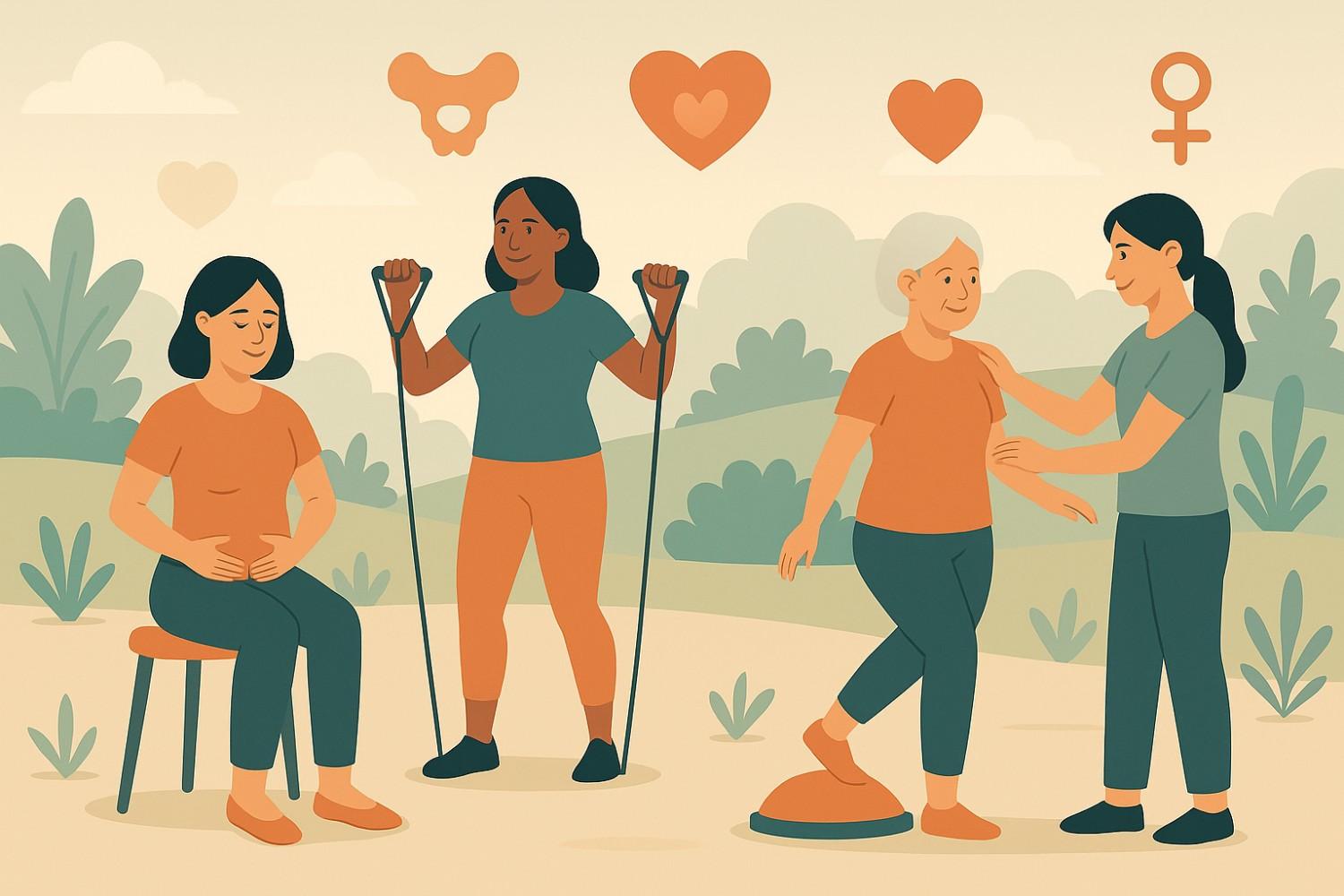Introduction
When people think of physiotherapy for women, pregnancy and postnatal care often come to mind. While it’s true that physiotherapists play a vital role in supporting women during and after childbirth, their contribution extends far beyond those stages. From puberty to menopause and beyond, physiotherapy can address a wide range of physical challenges unique to women.
Whether it’s managing menstrual pain, improving pelvic floor function, aiding recovery from surgeries like hysterectomy, or supporting women with conditions like PCOS, osteoporosis, or incontinence, physiotherapy empowers women to live healthier, more active lives. With specialized training in women’s health, physiotherapists help restore balance, reduce pain, and improve daily functioning—at any age and stage.
In this blog, we’ll explore the lesser-known yet incredibly important roles of physiotherapy in women’s health beyond pregnancy, and how it can make a meaningful difference in every woman’s life.
✅ 1. Beyond Pregnancy: What is Women’s Health Physiotherapy?
Women’s health physiotherapy is a specialized field that focuses on conditions and concerns specific to female anatomy and physiology. While pregnancy and postpartum rehabilitation are important aspects, this field covers much more, including:
- Pelvic floor dysfunction
- Urinary or fecal incontinence
- Menstrual-related disorders
- Chronic pelvic pain
- Post-surgical recovery (e.g., mastectomy, hysterectomy)
- Menopausal symptoms
- Osteoporosis
- Sexual health issues
Physiotherapists assess musculoskeletal, neurological, and visceral components to provide customized care that enhances quality of life.
✅ 2. Pelvic Floor Therapy: For Strength, Control, and Confidence
Many women experience pelvic floor issues—often silently—believing that leaking urine during exercise, coughing, or sneezing is “normal.” It’s not.
Pelvic floor physiotherapy involves exercises and biofeedback to:
- Strengthen weak pelvic muscles
- Relax overactive muscles
- Improve bladder and bowel control
- Enhance sexual function
- Alleviate pelvic organ prolapse symptoms
These therapies are valuable for women of all ages—not just postnatal mothers.
✅ 3. Menstrual and Chronic Pelvic Pain Management
Conditions like endometriosis, PCOS, and dysmenorrhea can cause debilitating pelvic or abdominal pain. Physiotherapists use:
- Soft tissue techniques
- Myofascial release
- Breathing and relaxation training
- Core stabilization
- Movement therapy
These approaches can reduce pain, lower stress, and improve overall pelvic mobility—helping women reclaim comfort during their cycles.
✅ 4. Menopause and Physiotherapy: Navigating Change Gracefully
Menopause brings hormonal shifts that affect muscle tone, joint flexibility, and bone health. Women may experience:
- Back pain
- Stiffness
- Incontinence
- Sexual discomfort
- Decreased bone density
A physiotherapist can provide:
- Postural training
- Resistance and weight-bearing exercises
- Pelvic floor strengthening
- Education on bone health and osteoporosis prevention
These helps ease symptoms, maintain independence, and support a healthy transition into post-menopausal life.
✅ 5. Physiotherapy After Gynaecological Surgery
Surgeries like hysterectomy, cesarean section, or breast surgery can lead to scar tissue, pain, and reduced function. Physiotherapists assist with:
- Scar tissue mobilization
- Core and pelvic floor retraining
- Lymphedema management (especially post-mastectomy)
- Safe reintroduction to physical activity
Early intervention promotes healing, reduces complications, and restores mobility and strength.
✅ 6. Bone Health and Osteoporosis Management
Women are at higher risk for osteoporosis, particularly post-menopause. Physiotherapists design programs to:
- Improve bone density through weight-bearing and resistance training
- Enhance balance and coordination to prevent falls
- Encourage safe functional movements for daily life
Regular guidance from a physio can help prevent fractures and build lifelong strength.
✅ 7. Empowering Women Through Education and Exercise
At the heart of women’s health physiotherapy is education. Understanding your body, recognizing symptoms, and knowing how to manage them empowers women to take control of their well-being.
Physiotherapists teach:
- Correct posture and movement
- Bladder training techniques
- Breathing exercises for stress and pain
- Lifestyle changes to support hormonal health
- Exercise routines tailored to each stage of life
This proactive, preventive approach supports long-term wellness and independence.
Conclusion
Physiotherapy is a powerful tool that supports women at every stage of life—not just during pregnancy. From pelvic floor rehabilitation and menstrual pain relief to menopause support and post-surgical recovery, women’s health physiotherapy offers personalized, science-backed care that restores function and confidence.
By addressing physical challenges early and holistically, physiotherapists help women maintain mobility, manage pain, and lead active, fulfilling lives. If you or someone you know is dealing with issues like incontinence, pelvic pain, or post-menopausal changes—don’t wait. Speak to a women’s health physiotherapist and take the first step toward feeling your best, inside and out.
Because women’s health is lifelong health—and you deserve to move through life pain-free and empowered.
– Dr. Aprajeeta Chouhan, Assistant Professor
Faculty Of Physiotherapy, Madhav University

